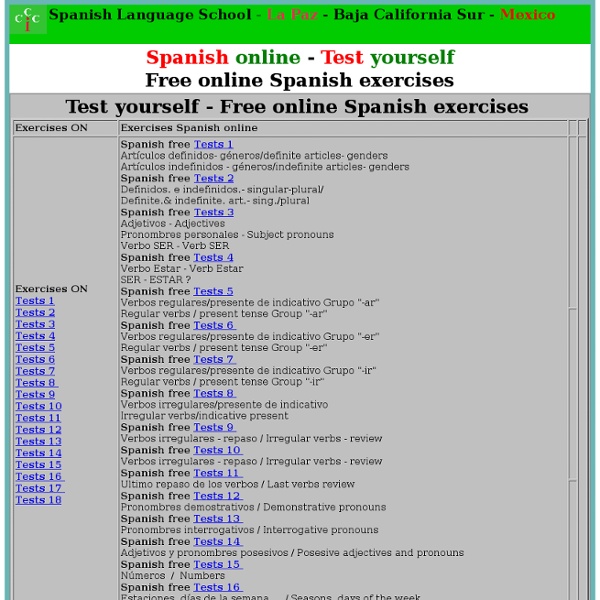



Start Learning Spanish — Lessons and Other Resources for the Beginning Spanish Student Spanish is one of the most-used languages in the world, and it's one that is relatively easy for English speakers to master. Whether you are studying Spanish at school, learning the language on your own or just wanting to pick up enough Spanish to make your travels more enjoyable, this collection of lessons and articles is designed to help you gain a fuller understanding of the language. Introduction to the Spanish Language These articles provide an overview of the language. Unit 1: The Basics These lessons introduce you to the building blocks of Spanish. Unit 2: Verbs, Adjectives and More In this group of lessons, we expand on the basics, focusing on verb conjugation and use of adjectives. Unit 3: Adverbs, Quantities and More Topics covered include learning how to count and use numbers, using adverbs and adjectives, and making comparisons. Unit 4: Prepositions and More As you learn how to use some of the common prepositions, you will be able to speak and write more complex sentences.
Ejercicios de vocabulario ¡Vale! En esta página los servicios de Google Analytics y de Google Adsense hacen uso de cookies. Más información Cookie Consent plugin for the EU cookie law Ejercicios de vocabulario Vocabulario temático (Con audio. Problemas lexicales Crucigramas Expresiones y refranes Formación de palabras Privacidad Juego de memoria Vocabulario práctico Juego del ahorcado (Con fotos de las palabras) Vocabulario neerlandés Vocabulario francés Vocabulario inglés Vocabulario húngaro English to French, Italian, German & Spanish Dictionary - WordReference.com Languages - Spanish - Mi Vida Loca: Real Spanish, Real Drama - Episode 1 Reading comprehension in Spanish Exercises, Spanish4Teachers.org This Spanish Reading Comprehension page printable resources and web-bases reading comprehension resources that you can use to teach, practice and/or assess reading comprehension in the Spanish language. Teachers please feel free to use these Spanish teaching resources, but we ask that you respect the copyright and footer information of all of them. Reading Comprehension in Spanish Exercises: Other Reading Comprehension Resources in Spanish:
Learn a Language | Free Online Language Learning Spanish phonology This article is about the phonology and phonetics of the Spanish language. Unless otherwise noted, statements refer to Castilian Spanish, the standard dialect used in Spain on radio and television.[1][2][3][4] For historical development of the sound system see History of Spanish. For details of geographical variation see Spanish dialects and varieties. Spanish has many allophones, so it is important here to distinguish phonemes (written between slashes / /) and corresponding allophones (written between brackets [ ]). Consonants[edit] The phoneme /ʝ/ is realized as an approximant in all contexts except after a pause, a nasal, or a lateral. The phoneme /ʎ/ (as distinct from /ʝ/) is found in some areas in Spain (mostly northern and rural) and some areas of South America (mostly highlands). Most speakers in Spain (except for Western Andalusia and all Canary Islands), including the variety prevalent on radio and television, have both /θ/ and /s/ (distinción). Consonant neutralizations[edit]
Verbe ver - Conjugaison espagnole (yo) veo(tú) ves(él) ve(ns) vemos(vs) veis(ellos) ven (yo) he visto(tú) has visto(él) ha visto(ns) hemos visto(vs) habéis visto(ellos) han visto (yo) veía(tú) veías(él) veía(ns) veíamos(vs) veíais(ellos) veían (yo) había visto(tú) habías visto(él) había visto(ns) habíamos visto(vs) habíais visto(ellos) habían visto (yo) vi(tú) viste(él) vio(ns) vimos(vs) visteis(ellos) vieron (yo) hube visto(tú) hubiste visto(él) hubo visto(ns) hubimos visto(vs) hubisteis visto(ellos) hubieron visto (yo) veré(tú) verás(él) verá(ns) veremos(vs) veréis(ellos) verán (yo) habré visto(tú) habrás visto(él) habrá visto(ns) habremos visto(vs) habréis visto(ellos) habrán visto (yo) vería(tú) verías(él) vería(ns) veríamos(vs) veríais(ellos) verían (yo) habría visto(tú) habrías visto(él) habría visto(ns) habríamos visto(vs) habríais visto(ellos) habrían visto que (yo) veaque (tú) veasque (él) veaque (ns) veamosque (vs) veáisque (ellos) vean -no veasno veano veamosno veáisno vean Règle du verbe ver Emploi du verbe ver